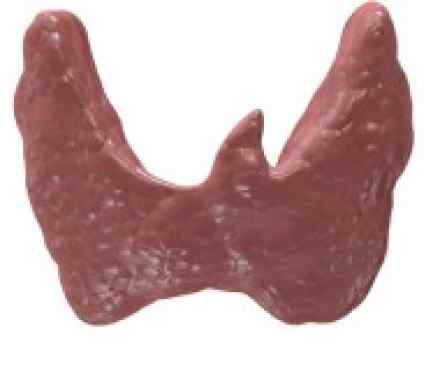
What is it?
- Hypoparathyroidism is a condition in which your body secretes abnormally low levels of parathyroid hormone (parathormone). This hormone plays a key role in regulating and maintaining a balance of your body's levels of two minerals — calcium and phosphorus.
- The low production of parathyroid hormone in hypoparathyroidism leads to abnormally low calcium levels in your blood and bones and to an increased amount of phosphorus.
- Treatment for hypoparathyroidism consists of taking supplements to normalize your levels of calcium and phosphorus. Because hypoparathyroidism is a chronic condition, treatment is generally lifelong.
Symptoms
Signs and symptoms of hypoparathyroidism can include:
- Tingling or burning (paresthesias) in your fingertips, toes and lips
- Muscle aches or cramps affecting your legs, feet, abdomen or face
- Twitching or spasms of your muscles, particularly around your mouth, but also in your hands, arms and throat
- Fatigue or weakness
- Painful menstruation
- Patchy hair loss, such as thinning of your eyebrows
- Dry, coarse skin
- Brittle nails
- Anxiety or nervousness
- Headaches
- Depression, mood swings
- Memory problems
Causes
Hypoparathyroidism occurs when your parathyroid glands don't secrete enough parathyroid hormone. You have four parathyroid glands — each about the size of a grain of rice — located in your neck, adjacent to your thyroid gland.
The low production of parathyroid hormone leads to abnormally reduced calcium levels (hypocalcemia) in your blood and bones and to increased amount of phosphorus (hyperphosphatemia).
Factors that can cause hypoparathyroidism include:
- Acquired hypoparathyroidism. This is the most common cause of hypoparathyroidism, and it develops after accidental damage to or removal of the parathyroid glands during surgery. This surgery may be a treatment for diseases of the nearby thyroid gland, or for throat cancer or neck cancer. The loss of function may be temporary, though it can also be permanent. Today, surgeons are aware of and more careful to avoid injuring the parathyroid glands in the course of surgery.
- Hereditary hypoparathyroidism. In this form, either the parathyroid glands aren't present at birth or they don't work properly.
- Autoimmune disease. In this condition, your immune system creates antibodies against the parathyroid tissues, trying to reject them as if they were foreign bodies. In the process, the parathyroid glands stop manufacturing their hormone.
- Extensive cancer radiation treatment of your face or neck, which can result in destruction of your parathyroid glands, or occasionally because of radioactive iodine treatment for hyperthyroidism.
- Low levels of magnesium in your blood, which can affect the function of your parathyroid glands. Normal magnesium levels are required for optimum secretion of parathyroid hormone.
Risk factors
Factors that may increase your risk of developing hypoparathyroidism include:
- Recent neck surgery, particularly if the thyroid was involved
- A family history of hypoparathyroidism
- Having certain autoimmune or endocrine conditions, such as Addison's disease — a condition characterized by a deficit in hormone production by the adrenal glands
Complications
Hypoparathyroidism may result in any of a number of complications. The following complications are due to low calcium levels, and most may improve with adequate treatment:
- Tetany, which refers to cramp-like spasms of your hands and fingers, which may be prolonged and painful; muscle discomfort; and twitches or spasms of the muscles of your face, throat or arms. When these spasms occur in your throat, they could interfere with breathing, creating a possible emergency.
- Paresthesias, which are characterized by sensory symptoms consisting of odd, tingling sensations or pins and needles feelings of your lips, tongue, fingers and feet.
- Loss of consciousness, with convulsions (grand mal seizures).
- Malformation of the shape and size of the teeth.
- Impaired kidney function.
- Heart arrhythmias and fainting, even heart failure.
Other complications are associated with hypoparathyroidism, but will not improve with calcium and vitamin D treatment:
- Stunted growth (short stature)
- Slow mental development (or mental retardation) in children
- Calcium deposits in the brain
- Cataracts
Diagnosis
Medical history
A doctor who suspects hypoparathyroidism begins the diagnostic process by taking a medical history and asking about your symptoms, such as muscle cramps or tingling of the extremities. He or she will also want to know whether you've had any recent surgeries, particularly operations involving the thyroid or neck.
Physical exam
Next, your doctor will conduct a physical examination, looking for signs that suggest hypoparathyroidism, such as facial muscle twitching.
Blood tests
You'll also undergo blood tests, and the following findings may indicate hypoparathyroidism:
- A low blood-calcium level
- A low parathyroid hormone level
- A high blood-phosphorus level
- A low blood-magnesium level
Your doctor may also order these additional tests:
- Electrocardiogram (ECG). This test involves taking electrical readings of your heart's activity. It can detect arrhythmias associated with hypocalcemia and, in turn, hypoparathyroidism.
- Urine test. Evaluation of a sample of your urine can show whether your body is excreting too much calcium.
- X-rays and bone density tests. These can determine whether abnormal calcium levels have affected the strength of your bones.
In diagnosing children, doctors check to see whether tooth development is normal and whether they have met developmental milestones.
References:
https://www.nlm.nih.gov/medlineplus/ency/article/000385.htm
https://en.wikipedia.org/wiki/Hypoparathyroidism
http://www.healthline.com/health/hypoparathyroidism
http://emedicine.medscape.com/article/122207-overview
http://www.medicinenet.com/hypoparathyroidism/article.htm
http://rarediseases.org/rare-diseases/hypoparathyroidism/

